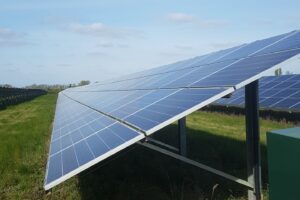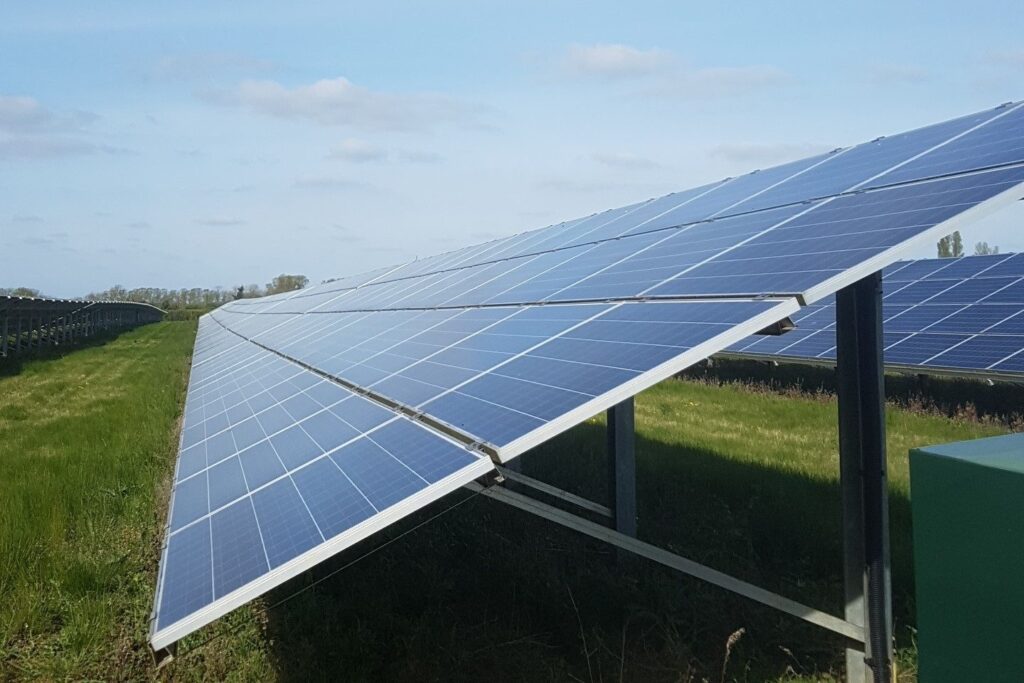Five years ago, Buncombe County, in collaboration with the City of Asheville, voted to adopt a resolution for county operations and the community as a whole to be powered by 100 percent renewable energy by 2042.
This is quite the ambitious goal, and one that more and more cities, counties, and states have committed to striving toward. In fact, according to the Clean Energy States Alliance, more than 51 percent of the U.S. population now lives in states that have established 100 percent clean energy goals. North Carolina is included on that list, as it recently set a goal for carbon neutrality in the electricity sector by 2050.
However, Buncombe County is way ahead of the state on this one, both in its time frame for transition and in the scope of its ambitions. Buncombe County’s goals focus not only on the electricity sector, but all energy sectors.

Setting lofty goals is a great first step in achieving high-level success, but the devil is in the details. How in the world does an entire county — not just government operations, but everyone and everything who resides within it — transition everything away from fossil fuels to run completely on renewable energy?
Well, that’s where the Blue Horizons Project Community Council (BHPCC) comes into play. The BHPCC is the successor to the Energy Innovation Task Force (EITF), which was a collaborative effort between Buncombe County, City of Asheville, and Duke Energy along with local business and nonprofit leaders. EITF realized its first goal several years ago by playing a key role in influencing Duke Energy’s decision to take off the table plans to build a natural gas peaker plant. With that accomplished, and under the new name of BHPCC, this dedicated group set their sights on the goal of a clean-energy future.
The BHPCC is composed of many different active parts, and one vital piece is that of the group working on the strategic plan. This group consists of several experts within their field who meet monthly, and work tirelessly to come up with a plan for Buncombe County to arrive at its 100 percent renewable energy goal by the year 2042.
Luckily, we have a solid foundation on which to build, including the “Moving to 100 Percent” report completed by The Cadmus Group. Building upon this report, the BHPCC strategic plan committee set out to tackle this challenge in phases.
Phase one is complete, and consists of developing a more comprehensive and inclusive calculation of overall baseline energy use within the county, and then utilizing that data to model and forecast future energy use. Of course, models and forecasts depend on a variety of factors, and no one can tell the future, but through this process we discovered three key elements to the success of transitioning the county to 100 percent renewable energy. The three key elements are as follows:
- Increase Efficiency: Undertake a variety of initiatives to reduce energy demand. The less energy needed, the less renewable energy required.
- Electrify Everything: Convert almost all current direct uses of fossil fuels to electricity, including but not limited to transportation, stoves and heaters.
- Green the Grid: All electricity produced (including that which comes from the utilities) needs to come from renewable energy sources.
Efficiency improvements and electrification can reduce the total energy required for the transition to renewable energy by about 50 percent. This drastically reduces the amount of renewable energy required to “green the grid” and get us to our goal.
Phase two of the process is where things start to hit home a bit more. In general, phase two will look at specific actions, projects and programs that we believe will help get us to 100 percent renewable energy by 2042. However, it is not as simple as A + B = C.
Phase two will not look solely at what will get us to 100 percent renewable energy, but it also entails considering all of the other effects that such endeavors might have, specifically on our community. We are working to find actions that benefit the local community as a whole, with an emphasis on those that have social justice and equity aspects, financial and economic development promise, promote sustainable land use and development, and that are feasible and scalable.
We also understand that our definitions and beliefs of what these terms and ideas mean to us may not fully capture what they mean to others in our community. Therefore, we are committed to engaging with the full range of Buncombe County stakeholders, especially BIPOC (Black, Indigenous and people of color) communities, in hopes to gain a better understanding of local priorities around energy efficiency and clean energy.
This engagement process will serve populations identified in the city of Asheville’s Climate Justice Data Map as well as other energy-burdened populations. The information gathered from this will guide the assessments and evaluations of future potential projects, actions, and programs to ensure that we are transitioning to 100 percent renewable energy in a just and equitable way.
Despite the constant onslaught of tragedies throughout the country and world with plenty to get us down, the 100 percent renewable energy goal is one of the things that I look to with hope and positivity. It is truly an exciting undertaking to be a part of that has incredible potential to create exponential good for so many people and the planet.
I look forward to seeing how the plan unfolds, and learning new and better ways to serve and improve our community and planet, while also achieving our community-wide goal of 100 percent renewable energy by 2042.
David Gordon received a master’s degree in Sustainability Studies from Lenoir-Rhyne University, and grew up in Oakland, Calif. He has worked as a teacher, naturalist, backcountry guide, Civicorps crew leader, park ranger, green builder, and currently serves as a project management consultant with Blue Horizons Project at Green Built Alliance. Connect with David at David@bluehorizonsproject.com.
You can also view this article as it was originally published on page 36 of the 2022-23 edition of the directory.


